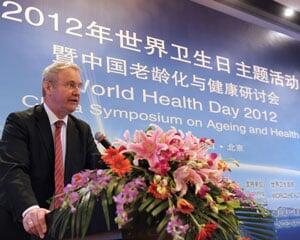BEIJING – "Good health adds life to years". This is the theme of this year's World Health Day, commemorated every year on 7 April, the anniversary of the founding of the World Health Organization (WHO). The Ministry of Health, together with China National Committee on Ageing, WHO and UNFPA, the United Nations Population Fund, marked the event with a campaign to promote healthy ageing, as the proportion of older people continues to grow worldwide.
In the next five years, for the first time in human history, the number of adults in the world aged 65 and over will outnumber children under the age of 5. While the global population is rapidly ageing, developing countries will experience the most rapid and dramatic demographic change. It took more than 100 years for France's population aged 65 or older to double from 7 to 14 per cent. In contrast, it will take countries like Brazil and China about 25 years to achieve the same growth.
China already has the largest elderly population in the world. According to the 2010 national census, there are 119 million people aged 65 and over, about 8.87 per cent of China's overall population.
To cope with the rapidly ageing population, Yin Li, Vice Minister of Health, stated at the Healthy Ageing Symposium on World Health Day that during the 11th Five-Year Plan period, the health service network for the older population continued to improve, the health insurance system for the older people kept growing, the health services provided to the older people expanded and health management of the older population was included as a priority into basic public health service package under the health care reform. During the 12th Five-Year Plan period, the Ministry of Health will further implement active strategies of healthy ageing and provide basic health services to the older people to ensure their access to health care services.
"Addressing the health needs of older people is the priority among active responses to the ageing population. It is necessary to optimize the supportive systems for the care of the elderly, develop the health industry that serves the older people, build up and improve the health care delivery system for the older people, and foster an ageing-friendly social environment," said Chen Chuanshu, Standing Vice President of China National Committee on Ageing.
"The global demographic trend is unprecedented, but we can prepare for it. By stressing healthy and active ageing, we appreciate the valuable contribution of older people and promote health throughout the course of life". Michael O'Leary, WHO Representative in China, was speaking at the symposium, together with Li, Chuanshu and Arie Hoekman, Representative of UNFPA in China.
“The ageing process presents societies with enormous challenges related to economic structure and growth, health care, and social security,” said Hoekman. “Governments need to respond to these challenges by promoting diversified support systems to ensure that families and communities can support the elderly to live healthy and active lives,” he stressed.
Good health across the life-course contributes to a happy and productive older age. "Healthy behaviors earlier in life – such as eating right, staying physically active, and avoiding tobacco and too much drinking – can help us to stay healthy as we age," said O'Leary.
In China, the 12th Five Year Development Plan on Ageing includes developing a nationwide system of older people's homes with 3.42 million more beds for the elderly, encouraging all grassroots medical institutions to provide health services for older people and monitor the health conditions of people aged 65 years and over, strengthening the role of families, and developing an ageing industry to respond to the health care needs of the elderly. The UN in China is committed to support the government to develop a sound monitoring mechanism to measure the progress against and targets set in the 12th Five Year Development Plan on Ageing.
WHO and UNFPA join the Ministry of Health and China National Committee on Ageing in recognizing that older people are indeed a valuable resource in communities, and that healthy ageing is the key to ensuring their continuing contribution to the society.


